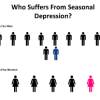- Empty cart.
- Continue Shopping
The Relationship Between Aging and Cognitive Decline in Men

Cognitive decline, including changes in memory, reasoning, and other cognitive functions, is a natural part of the aging process. While these changes can affect both men and women, research suggests that there may be distinct patterns and factors influencing cognitive decline in men.
Cognitive Aging in Men: Key Considerations
1. Slower Onset of Cognitive Decline
Studies indicate that men tend to experience a slower onset of cognitive decline compared to women. This means that cognitive functions, such as memory and processing speed, may decline at a slower rate in men as they age.
2. Different Cognitive Profiles
Men and women may exhibit different cognitive profiles as they age. For example, some research suggests that men may experience greater declines in visuospatial skills and verbal memory, while women may experience greater declines in verbal fluency and verbal memory.
3. Hormonal Changes
Hormonal changes associated with aging can impact cognitive function in men. The decline in testosterone levels that occurs with age may be linked to changes in cognitive performance. Some studies have explored the potential benefits of testosterone replacement therapy in mitigating cognitive decline in older men, but more research is needed to fully understand these effects.
Factors Contributing to Cognitive Decline in Men
Several factors contribute to cognitive decline in men as they age:
1. Cardiovascular Health
Maintaining good cardiovascular health is crucial for cognitive function. Conditions like high blood pressure, high cholesterol, and diabetes can increase the risk of cognitive decline. Adopting a heart-healthy lifestyle, including regular exercise and a balanced diet, can help mitigate these risks.
2. Brain Health
Maintaining brain health is essential for cognitive function. Engaging in mentally stimulating activities, such as puzzles, reading, and learning new skills, can help preserve cognitive abilities.
3. Social and Emotional Well-being
Social engagement and emotional well-being play a vital role in cognitive health. Staying socially connected, participating in meaningful activities, and managing stress and depression can contribute to cognitive resilience.
4. Sleep Quality
Quality sleep is essential for cognitive function. Poor sleep patterns, including sleep apnea and insomnia, can impair cognitive performance. Practicing good sleep hygiene and seeking treatment for sleep disorders can improve cognitive outcomes.
5. Substance Abuse
Substance abuse, including excessive alcohol consumption and drug use, can have detrimental effects on cognitive function. Reducing or eliminating substance abuse is crucial for maintaining cognitive health.
Strategies for Maintaining Cognitive Health in Aging Men
1. Regular Physical Activity
Engage in regular physical exercise, as it has been shown to have a positive impact on cognitive function. Activities like walking, swimming, and strength training can help improve cardiovascular health and brain function.
2. Healthy Diet
Adopt a balanced and nutritious diet that includes a variety of fruits, vegetables, whole grains, lean proteins, and healthy fats. Omega-3 fatty acids, found in fish and nuts, may have cognitive benefits.
3. Mental Stimulation
Stay mentally active by challenging your brain with puzzles, games, reading, and learning new skills or hobbies.
4. Social Engagement
Maintain strong social connections with family and friends. Engage in social activities and community involvement to stay mentally and emotionally engaged.
5. Stress Management
Practice stress-reduction techniques such as mindfulness, meditation, and relaxation exercises to manage stress effectively.
6. Regular Check-ups
Visit healthcare providers regularly for check-ups and screenings to monitor and manage risk factors like high blood pressure, cholesterol levels, and diabetes.
7. Adequate Sleep
Prioritize good sleep hygiene and aim for 7-9 hours of quality sleep per night.
8. Limit Substance Use
If you consume alcohol, do so in moderation, and avoid recreational drug use. Seek help for substance abuse issues if necessary.
In Conclusion, Cognitive decline is a natural part of the aging process in both men and women. While men may experience certain differences in the patterns of cognitive decline, maintaining cognitive health in aging men requires attention to factors like cardiovascular health, mental stimulation, social engagement, and emotional well-being. By adopting a healthy lifestyle and implementing strategies to support cognitive function, men can enhance their quality of life as they age and promote cognitive resilience.








